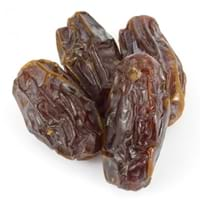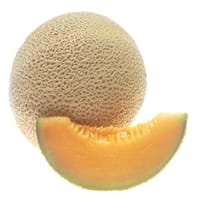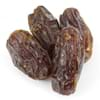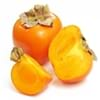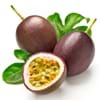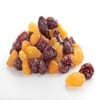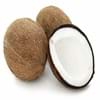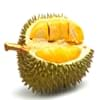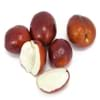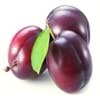Health Benefits
Cancer prevention, Cures gastro-intestinal troubles, Diarrhea treatment, Heart care, Heat stroke treatment, Improves muscular strength, Prevents constipation, Prevents nerve damage, Strengthening of bones
Cancer prevention, Heart care, Improves eye vision, Prevents diabetes, Reduces stress
General Benefits
Boosts immune system, Maintains healthy cholesterol level, Strengthens bones
Boosts immune system, Cures cough, Cures fever, Digestive aid, Eye care, Helps in weight loss
Skin Benefits
Anti-aging benefits, Brightens and lightens complexion, Reduces wrinkles, Treatment of skin diseases
Anti-aging benefits, Hydrates skin, Skin rejuvenation, Treatment of skin diseases
Hair Benefits
Prevents hair loss, Promotes longer and healthier hair, Protects hair, Regulates hair growth
Good conditioner, Prevents hair loss, Protects hair
Allergy Symptoms
Redness of eyes, Runny nose, Sneezing, Watery eyes
Abdominal pains, Anaphylaxis, Breathing difficulty, Diarrhea, Dizziness, Hives, Itching of mouth, Nasal congestion, Nausea, Vomiting
Side Effects
Allergic reaction, Diarrhoea, Intestinal gas, Stomach pain, Tooth decay, Weight gain
Allergic reaction, Bloating, Indigestion
Best Time to Eat
Any time except an hour after meal, Don't consume at night and before bed
As a snack in the late afternoon, Don't consume at night and before bed, Eat the fresh ones, avoid mixing with any other foods, don't eat after meal., Morning time (before lunch)
Vitamin B5 (Pantothenic Acid)
Vitamin C (Ascorbic Acid)
Vitamin K (Phyllochinone)
Phytosterol
Not Available
Calories in Fresh Fruit with Peel
Not Available
Calories in Fresh Fruit without Peel
Not Available
Calories in Frozen Form
Not Available
Calories in Canned Form
Not Available
Not Available
Season
Spring, Summer
Summer
Varieties
Barhi, Dayri, Deglet Noor, Halawy, Khadrawy, Medjool, Thoory and Zahidi
Hales Best Jumbo, Sweet 'N Early Hybrid, Hearts of Gold, Ambrosia, Athena, Honey Bun Hybrid, Fastbreak and Superstar
Color
Black, Brown, Red, Yellow
Orange
Inside Color
Brown
Creamy Orange
Taste
Sweet
Juicy, Musky, Sweet
Origin
Iraq
Africa, India
Soil Type
Clay, Loam, Sand
Sandy
Climatic Conditions
Hot, Warm
Dry, Hot
Facts about
- Date is known as the tree of life in Middle east.
- Date palms cover 3% of the earth's total farmlands.
- Scholars believe that date (and not apple) was the real fruit mentioned in the Bible's Garden of Eden.
- Cantaloupe is known as rock-melon in some parts of the world.
- Christopher columbus first introduced cantaloupes to north america in 1494.
- The name 'Cantaloupe' as it is cultivated in papal gardens of cantaloupes, Italy.
Spirits
Not Available
Yes
Cocktails
Not Available
Yes
Other Countries
Algeria, Iraq, Oman, Pakistan, South Africa, United Arab Emirates
Iran, Romania, Turkey, United States of America
Top Importer
India
United States of America
Top Exporter
United Arab Emirates
Spain
Botanical Name
Phoenix Dactylifera
Cucumis melo var. cantalupensis
Synonym
Not Available
Cucumis melo var. reticulatus
Subkingdom
Tracheobionta
Tracheobionta
Division
Magnoliophyta
Magnoliophyta
Class
Liliopsida
Magnoliopsida
Subclass
Arecidae
Dillenhidae
Order
Arecales
Cucurbitales
Family
Arecaceae
Cucurbitaceae
Species
P. dactylifera
C. melo
Difference Between Date and Cantaloupe
We might think that Date and Cantaloupe are similar with respect to nutritional value and health benefits. But the nutrient content of both fruits is different. Date and Cantaloupe Facts such as their taste, shape, color, and size are also distinct. The difference between Date and Cantaloupe is explained here.
The amount of calories in 100 gm of fresh Date and Cantaloupe with peel is 282.00 kcal and Not Available and the amount of calories without peel is Not Available and 34.00 kcal respectively. Thus, Date and Cantaloupe belong to High Calorie Fruits and Low Calorie Fruits category.These fruits might or might not differ with respect to their scientific classification. The order of Date and Cantaloupe is Arecales and Cucurbitales respectively. Date belongs to Arecaceae family and Cantaloupe belongs to Cucurbitaceae family. Date belongs to Phoenix genus of P. dactylifera species and Cantaloupe belongs to Cucumis genus of C. melo species. Beings plants, both fruits belong to Plantae Kingdom.
